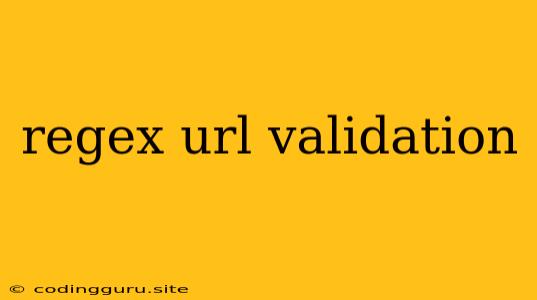Regex URL Validation: Ensuring Correct Website Addresses
In the vast world of the internet, URLs (Uniform Resource Locators) are the essential address markers that guide us to specific online content. Ensuring the validity of a URL is paramount, whether you're building a web form, processing user input, or implementing any system that involves web addresses. This is where regex URL validation comes into play.
Why is URL Validation Important?
Imagine a website allowing users to enter links to their social media profiles. Without proper validation, a user could input an incorrect or malicious URL, leading to errors or potential security vulnerabilities.
Here's a breakdown of why URL validation is crucial:
- Preventing Errors: Invalid URLs can cause website errors, interrupting user experience and potentially damaging your application's functionality.
- Maintaining Security: A robust validation system can prevent users from entering malicious URLs that could lead to phishing attacks, data breaches, or other security risks.
- Ensuring Data Integrity: Validating URLs helps maintain the accuracy and consistency of data stored within your system.
Introducing Regex (Regular Expressions) for URL Validation
Regex (Regular Expressions) are powerful tools used to match patterns in strings. They offer a concise and flexible way to validate URLs and ensure they adhere to specific formatting rules.
How Regex Works for URL Validation
Regex patterns for URL validation typically involve matching specific components of a URL:
- Protocol: "http://" or "https://", indicating the communication protocol.
- Domain: The main website address, like "example.com".
- Path: The specific location of a resource within the website, for example, "/about-us".
- Optional Components: These include ports, query parameters, and fragments.
Here's a simplified example of a basic regex pattern to validate URLs:
^https?:\/\/[^\s]+\.[^\s]+$
Explanation:
- ^: Matches the beginning of the string.
- https?:: Matches either "http" or "https".
- //: Matches the "//" characters after the protocol.
- [^\s]+: Matches one or more characters that are not whitespace. This represents the domain.
- **.**: Matches a dot "." character, separating the domain and the top-level domain.
- [^\s]+: Matches one or more characters that are not whitespace, representing the top-level domain.
- $: Matches the end of the string.
Creating a Regex Pattern for URL Validation
There's no one-size-fits-all regex pattern for URL validation. The complexity of your requirements and the specific format you want to enforce will determine the pattern you choose.
Here are some key factors to consider when constructing your regex URL validation pattern:
- Protocol: Do you want to allow both HTTP and HTTPS? You can adjust the pattern to enforce specific protocols.
- Domain: Do you have any restrictions on the domain name? For example, do you want to limit allowed domains to specific TLDs (Top-Level Domains) like .com or .org?
- Path: Do you need to validate the path structure? For example, you might need to ensure the path starts with a slash "/" or follow a specific pattern.
- Optional Components: Do you need to validate the presence or format of ports, query parameters, or fragments?
Tips for Crafting Effective Regex Patterns
- Start Simple: Begin with a basic pattern and gradually add complexity as needed.
- Use Online Regex Tools: There are various online tools that allow you to test and refine your regex patterns.
- Test Thoroughly: Ensure your regex pattern effectively captures valid URLs while rejecting invalid ones.
Examples of Regex URL Validation Patterns
Here are some more comprehensive regex URL validation patterns:
1. Basic URL Validation (allowing HTTP and HTTPS):
^https?:\/\/[^\s]+\.[^\s]+$
2. URL Validation with Specific TLDs (Top-Level Domains):
^https?:\/\/[^\s]+\.(com|org|net)$
3. URL Validation with Path Restriction:
^https?:\/\/[^\s]+\.[^\s]+\/[\w\.-]+$
4. Comprehensive URL Validation:
^(https?:\/\/)?([\da-z\.-]+)\.([a-z\.]{2,6})([\/\w \.-]*)*\/?$
Integrating Regex URL Validation in Your Application
- JavaScript: JavaScript provides built-in methods like
RegExpandmatchfor regex URL validation. - Python: Python utilizes the
remodule for working with regular expressions. - PHP: PHP offers the
preg_matchfunction for regex operations.
Conclusion
Regex URL validation is a fundamental practice in web development and data processing. By implementing robust validation mechanisms, you can ensure the accuracy, security, and integrity of your applications. Regular expressions provide a flexible and efficient way to validate URLs and prevent potential errors and security risks. Remember to start with a basic pattern, test it thoroughly, and adapt it to your specific requirements.
